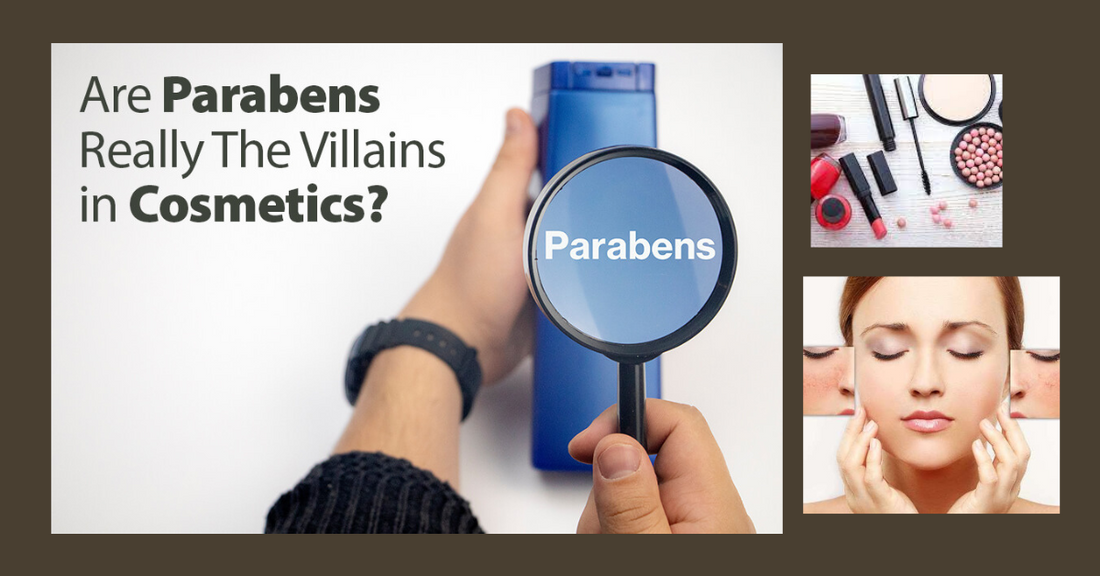Beauty products are more advanced than ever. While innovative products that address endless cosmetic imperfections may sound exhilarating, there has been significant concern regarding the increasing number of synthetic ingredients used in the cosmetics that we slather, layer, coat, cover, spread and smear on our bodies.
One man-made ingredient of growning concern is parabens which are used in cosmetics and hair care products.
What are parabens?
Parabens are commonly used in cosmetics, hair and skincare products as well as in the food and pharmaceutical industries. These products include makeup, shampoo, conditioner, moisturizers, lotions, deodorants and shaving products. Parabens are used in personal products as a preservative and to prevent bacteria and mold growth. Often products will contain more than one type of paraben and parabens will frequently be combined with other preservatives.
Is the use of preservatives in cosmetics regulated by the FDA?
The FDA does not have specific rules that apply only to cosmetic preservatives. The law treats preservatives in cosmetics in the same way as other cosmetic ingredients. Cosmetic products and ingredients, besides color additives, do not require FDA approval before being sold in the United States under the Federal Food, Drug, and Cosmetic Act.
What are the dangers of long-term exposure to parabens in cosmetics?
Because most parabens are found in conventional beauty products, daily use of these products over an extended period of time can be a cause for concern. These products, and their paraben ingredients, are absorbed through the skin and into the body. The paraben absorption through personal products can lead to various side effects:
- Permeates the skin
The main issue with parabens is that they can penetrate your skin and enter your bloodstream. Parabens were discovered to be xenoestrogens (compounds that act like estrogen hormones in your body) in the 1990s. This means that the body misidentifies parabens as estrogen. Estrogen disruption has been linked to several medical conditions including breast cancer and reproductive issues.
- Skin irritation and allergy
Parabens have been linked to allergic reactions of the skin. Parabens are used in skin care products to make our skin look beautiful; however, some studies suggest that methyl type parabens increase the skin's sensitivity to UV rays. This increased sensitivity causes skin cells to be destroyed more quickly and contributes to premature skin aging.
Paraben-containing products can cause dermatitis which can include skin inflammation, skin rashes, redness, scaling and itchy skin. Continuous use of paraben-based products can cause rosacea in some people.
- Unhealthy for the scalp and hair
Shampoos for your hair are one of the most common products that contain parabens. Using paraben-containing shampoos and conditioners can harm your scalp causing skin irritation as well as hair loss.
- Parabens are Endocrine Disruptors (EDs)
Parabens have a chemical structure that is similar to the hormone estrogen. According to research, this estrogen-mimicking classifies them as endocrine disruptors. Parabens can interfere with nuclear receptors for androgens, estrogens, progesterone, glucocorticosteroids etc.
Parabens have been linked to cases of early puberty in girls. Endocrine disruption can cause various issues, including adult acne, male breast growth, developmental, reproductive and neurological disorders, and various cancers. Research has also determined that parabens can alter thyroid hormone levels.
- Breast Cancer Connections
Some studies have shown that parabens can mimic the activity of the estrogen hormone in the body's cells which been linked to certain types of breast cancer. The female hormone estrogen has been shown to stimulate the growth and division of both normal and cancerous breast cells. Parabens have been discovered in breast tumors.
Will paraben-free ingredients be the future of cosmetics?
With consumers demanding transparency in beauty labels and formulations, as well as an emphasis on safety and sustainability, consumers are turning away from chemically-infused products containing ingredients such as parabens.
Scientific evidence suggests that along with the relatively minor skin irritation and allergies that that parabens can cause, they can also cause the serious side effects of disrupting hormones in the body, harm fertility and reproductive organs, affect birth outcomes and increase cancer risk.
Some manufacturers have already embraced the creation of paraben-free products including cosmetics, hair care products and deodorants.
Conclusion
In our pursuit of beautiful skin and hair, we frequently overlook the impact of various risky ingredients found in beauty products. Many of these ingredients can be harmful to your skin and hair and your health. Parabens-free products are available and fortunately, many of them perform as well, or better, than their paraben containing counterparts.
 Free of Parabens, GMO's, Sulfates, & More!
Free of Parabens, GMO's, Sulfates, & More!

